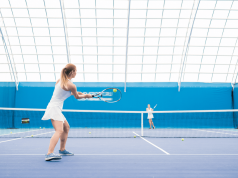Table Tennis or Ping Pong is a lot like tennis, but played indoors and with smaller more specialized rackets (called paddles in table tennis). Most of us have played it at rec halls or in the basements of our family’s homes…but few of us actually know the sport’s techniques and basic strokes applied to make it a game. Whether you seeking to get into table tennis more professionally, or just want to improve your advantage casually; we’ve listed the most popular strokes in table tennis below, how to apply them, and general tips for your game.
In any of the strokes below, it is necessary to remember to keep a loose but controlled grip. Your arm should be relaxed, and your hitting powering should come from your forearm, wrist, and waist in one fluid motion. Table Tennis actually requires more exercise and movement than most think, but not only do you call upon your torso, forearm, and wrist; but proper form includes quick and agile movements from side to side, as your feet will be moving around a lot. Also, drives and pushes will function differently, in that it is best to employ a drive at the top of the ball’s bounce, whereas a push should be directed right after the bounce.
The Forehand Drive
·Draw your right upper arm in close to the side of your upper body, but loosely.
·Bend arm so that your forearm forms a 90 degree angle with your upper arm.
·Move your elbow back slightly, so that your forearm is at 3 o’clock position with the side of your body.
·Make sure your feet are shoulder-width apart, and that your left foot is a bit in front of your right for balance.
·Let waist move with this movement, while at the same time shifting your weight to the right foot.
·While shifting to your left foot, swing forward with right arm using your waist as a driving force.
·Make sure your paddle is turned slightly downwards before contact with the ball, and that the ball is slightly to the side of your body.
·Follow through, with your paddle’s position ending parallel to your left shoulder.
The Backhand Drive
·From starting position, move waist to the left.
·At the same time, draw your right arm across your body to the left until it is in a 9 o’clock position.
·Weight should have been transferred to the back or left foot for balance.
·Make contact with the ball in front of your body, while shifting weight back to the front or right foot.
·Using your elbow as a pivot, snap your forearm forward and slightly upwards.
·Follow through, with your paddle’s position ending at 1 o’clock.
The Forehand Push
·From starting position, swing waist to right.
·At the same time, raise your right arm up and back to about 11 o’clock, with elbow close to waist.
·Weight should be on the back or right foot.
·Bend your wrist slightly back.
·Swing paddle forward and down, while at the same time switching weight to forward or left foot.
·Make contact with the ball in front and to the right of your body, and snap wrist forward.
·Follow through forward and down.
The Backhand Push
·From starting position, move waist to the left.
·At the same time, draw your right arm across to the left side of your body, with elbow close to your waist.
·Weight should be on the back or left foot.
·Draw your racket slightly up and back, with wrist bent back a bit.
·Make contact with the ball directly in front of you, and follow through with the same snapping motion.
http://www.articlesbase.com/sports-and-fitness-articles/basic-strokes-of-table-tennis-315713.html













